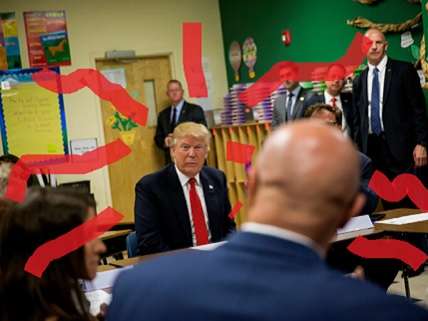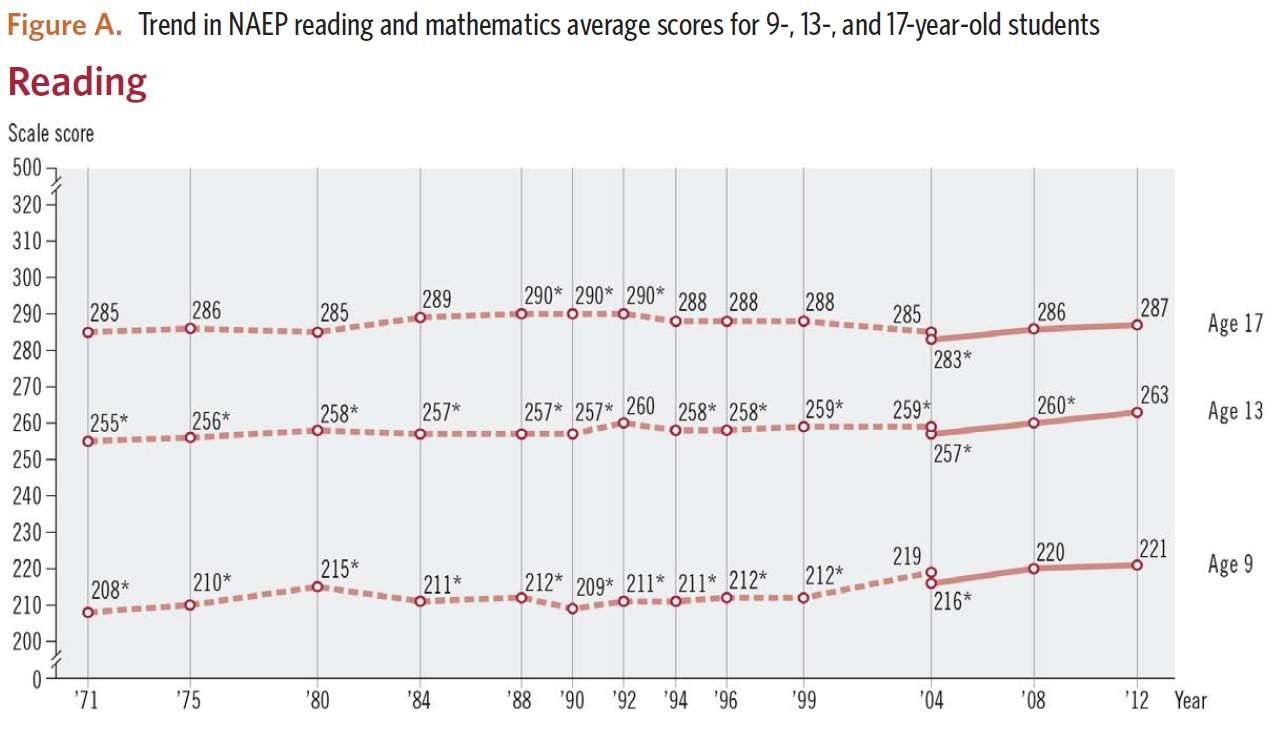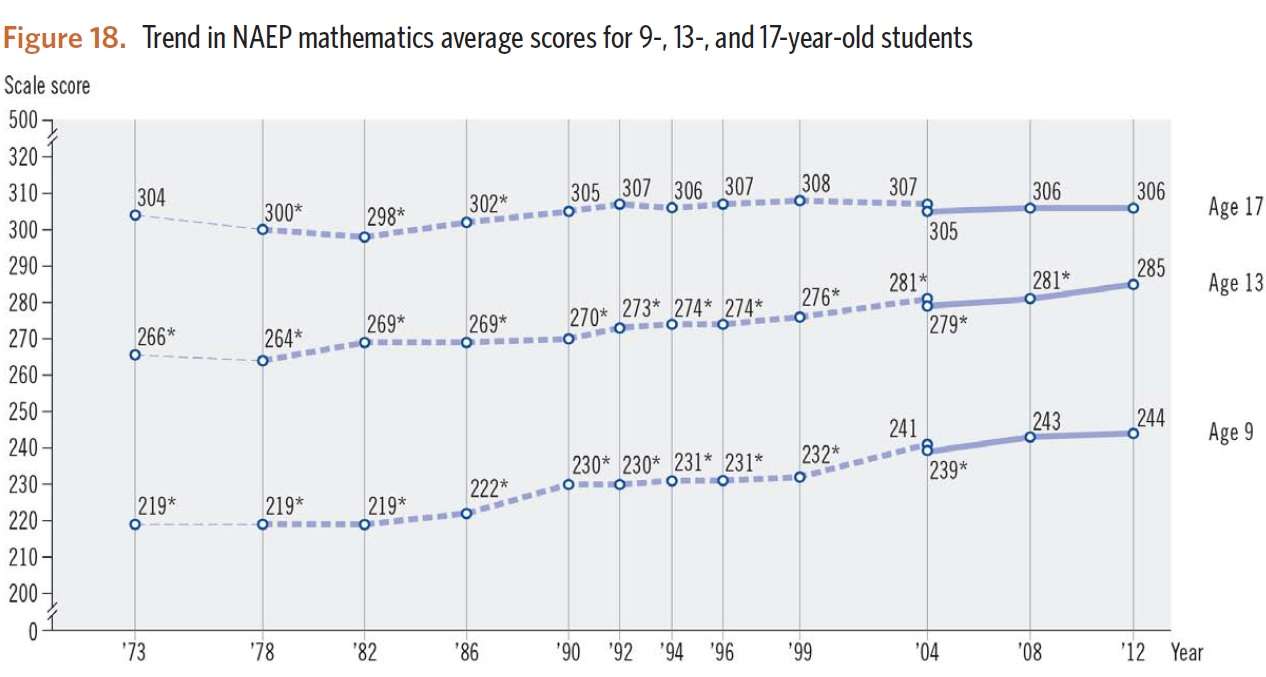Donald Trump Supports School Choice. Here's Why You Should Too.
We're spending more than double what we used to spend per pupil with no improvement on tests for high school seniors.

Earlier this week, President Donald Trump did something good: For the second year in a row, he issued a proclamation supporting National School Choice Week, an annual event that promotes interest in and discussion of ways to bring more options to K-12 students and their parents. The full proclamation is after the jump, but here's a snippet:
Communities that provide academic options — traditional public, public charter, private, magnet, parochial, virtual, and homeschooling — empower parents and guardians to select the best educational fit for their children.
School choice helps alleviate common hindrances to success and creates the space necessary for students' aspirations to flourish. Families that participate in school choice programs are not the only ones who benefit from expanded educational options. Children in traditional public schools benefit as well. In fact, 29 of the top 31 empirical studies on the topic find that freedom of school choice improves the performance of nearby public schools.
I disagree with Donald Trump on many, probably most, issues. But he's absolutely correct in insisting that parents should have more choices on where to send their kids to school, curricula to choose from, and how to individualize learning. America is a post-industrial country and we no longer put up with standardized food, clothing, lifestyles, or housing. Why should something as fundamental as education—"Life in the United States starts with a 13-year mandatory minimum K-12," quips Earn.com's CEO Balaji Srinivasan—be as ossified and stratified as it is? Across the United States, per-pupil spending averages over $13,000, which is up from about $6,000 in 1970 (in constant dollars). I'd wager there is no other area in our lives where costs have skyrocketed by more than double while the underlying good or service has not radically improved or been completely superseded by something else.
Yet the most basic measure of outcome, scores on standardized tests for graduating seniors on the National Assessment of Educational Progress, has not improved:


So we're spending tons more money per student and yet getting the same basic result.
There are, of course, many ways to dispute this. Kids today are more disadvantaged (not true), schools are expected to do so much more (not really true, or, same thing, schools choose to prioritize all sorts of stuff over learning), teachers are underpaid compared to the past, so the current crop is simultaneously less good and unmotivated (not true, not true).
Beyond anything related to test scores, which are at best a bad proxy for knowledge and achievement, we might ask whether that $13,000 per K-12 student could be spent in ways that make learning more interesting for kids. The answer here is: Of course it can be. There's a reason why school choice—whether in terms of charters, vouchers, Educational Savings Accounts (ESAs), scholarship programs, and more—is growing and it's not because traditional residential-assignment schools are popular. As University of Arkansas researcher Jay P. Greene has put it, the move toward broadly defined school choice has "reached escape velocity" because parents and students are demanding the same sort of flexibility, personalization, engagement, and attention from education that we take for granted in all other parts of our lives.
Here is Trump's full proclamation:
All American children deserve the opportunity to achieve their dreams through hard work and personal integrity. Our Nation's education policies must support them on their journeys, recognizing the diverse career goals and academic needs of students in communities across our country. During National School Choice Week, we honor those dedicated educators, administrators, and State and local lawmakers, who promote student-focused academic options for all families, as we increase educational freedom for all Americans.
The United States is one of the most educated countries in the world. Almost 90 percent of American adults attain a high school diploma or GED. But our students deserve more than just a paper diploma. Indeed, they deserve access to an education that provides the tools needed to succeed in our ever-evolving world. To maintain our global leadership and strengthen our modern economy, America's education system must prepare students for the unforeseen challenges of the future. Communities that provide academic options — traditional public, public charter, private, magnet, parochial, virtual, and homeschooling — empower parents and guardians to select the best educational fit for their children.
School choice helps alleviate common hindrances to success and creates the space necessary for students' aspirations to flourish. Families that participate in school choice programs are not the only ones who benefit from expanded educational options. Children in traditional public schools benefit as well. In fact, 29 of the top 31 empirical studies on the topic find that freedom of school choice improves the performance of nearby public schools.
My Administration is refocusing education policy on students. We are committed to empowering those most affected by school choice decisions and best suited to direct taxpayer resources, including States, local school boards, and families. As part of my steadfast commitment to invest in America's students, I signed into law the Tax Cuts and Jobs Act last December. One of the bill's provisions includes an expansion of 529 education savings plans so that their funds can be allocated tax-free to K-12 public, private, and religious educational expenses. By giving parents more control over their children's education, we are making strides toward a future of unprecedented educational attainment and freedom of choice. Under the leadership of Secretary of Education Betsy DeVos, we will continue to advance school choice so that every child in America has access to the tools best suited to enabling them to achieve the American Dream.
During National School Choice Week, I encourage parents to explore innovative educational alternatives, and I challenge students to dream big and work hard for the futures they deserve. I also urge State and Federal lawmakers to embrace school choice and enact policies that empower families and strengthen communities.
NOW, THEREFORE, I, DONALD J. TRUMP, President of the United States of America, by virtue of the authority vested in me by the Constitution and the laws of the United States, do hereby proclaim January 21 to January 27, 2018, as National School Choice Week.
IN WITNESS WHEREOF, I have hereunto set my hand this twenty-second day of January, in the year of our Lord two thousand eighteen, and of the Independence of the United States of America the two hundred and forty-second.
DONALD J. TRUMP
Reason is a proud media partner of National School Choice Week, an annual event promoting the ability of parents and students to have greater options in K-12 education. Go here to get more information about events and data about how increasing school choice—charters, vouchers, educational savings accounts, and more—is one of the best ways to improve education for all Americans. For a constantly updated list of stories about school choice, go to Reason's archive page.


Show Comments (92)